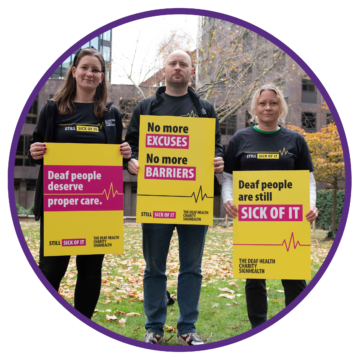BASW Blog: Deaf awareness training is not mandatory in social work practice – which begs the question, how can we inspire change if we are not listening?
By Rebekah Pierre, BASW England Professional Officer
We live in a world full of noise – yet as a society, we lack the ability to truly listen.
This is especially true when it comes to those whose needs differ from our own – such as the deaf community, which remains one of the most marginalised groups in the UK despite making up around 9 million of the population.
Barriers to equality arise early. According to Susan Daniels, chief executive of NDCS, “deaf children arrive at school with amazing potential only to begin a lifetime of being left behind”.
And obstacles do not disappear once a child reaches 18 – 56% of deaf or hard of hearing employees have experienced discrimination during their career, making the Equality Act 2010 appear ignored. With statistics like these, it is no surprise that deaf people are twice as likely to suffer from depression as hearing people.
The pandemic has exacerbated pre-existing inequalities – so much so that deaf people have been dubbed ‘COVID’s forgotten victims’. Throughout the pandemic, a lack of accessible information has meant deaf people are frequently excluded from live COVID-19 briefings which contain what is, for many, life or death information.
In the absence of interpreters, an 85-year-old man referred to as ‘AK’, who lives alone with no internet access, was unaware about emergency actions being taken by the government until his daughter told him days after the first address from the Prime Minister. This is just one of many stories to have emerged from the #whereistheinterpreter campaign, who are preparing to take legal action on the matter.
As social workers, we may believe we are exceptions to the rule when it comes to our treatment of the deaf community; after all, anti-discriminatory practice is enshrined into our values and ethics.
But the reality is, deaf awareness training is not mandatory in social work practice. Which begs the question – how can we inspire change if we are not listening?
Key challenges faced by deaf communities in child protection procedures
Marie Vickers, Domestic Abuse Service Manager at SignHealth, explains that within child protection processes, social workers have little understanding of deaf culture. Often, erroneous assumptions are made based on what is considered ‘normal’ in the hearing world.
‘In deaf culture families communicate differently. For example, to gain the attention of a Deaf person, people use touch such as a shoulder tap. Children will often pull the faces of their Deaf parents to get their attention too. These types of physical actions have been misunderstood as abusive by social workers, which is not true.”
Another issue is that deaf people are deprived of autonomy, due to a lack of interpreting provision. Social workers are time-pressed, but this could easily be addressed through planning.
‘Often children are asked to interpret on behalf of their parent, which is highly inappropriate. Perpetrators have even been asked to interpret, affording them more power and control’.
When it comes to meeting the needs of deaf children and CODAs (children of deaf adults), Marie says ‘social workers often do not realise that these children experience the world differently’, meaning that traditional ‘pen and paper’ direct work may not work.
It is imperative, she adds, that ‘social workers tailor interventions. Otherwise, they will be excluded from yet another service’.
This is why BASW is working with SignHealth in an upcoming webinar on deaf awareness training. The webinar – Deaf Awareness in Child Protection Social Work – takes place on 7 January from 12:30 to 1:45. Attendees will be able to take part in an open Q&A session to find out more about best practice with deaf children and families.
Top Tips for improving practice with deaf children and families
1) Identify & Meet the Specific Communication Need
There are different forms of sign language – do not make assumptions as to which is used. The most common form in England is British Sign Language (BSL).
Book the same interpreter for continuity (who should be a fully qualified registered sign language interpreter with NRCPD and carry a registration badge). Allowing positive relationships to form will encourage trust and openness.
Provide breaks for interpreters. In meetings with multiple professionals, book more than one interpreter to allow for this.
Provide an advocate who understands all procedures taking place.
Allow time for information to be translated by interpreters (Deaf or hearing) during meetings or beforehand. English is not the first language of a deaf person, and information can be lost through reports. BSL, for example, has a different structure to English.
A lack of literacy is often seen negatively, even though the deaf person is living in a world designed for hearing people. Adopting an understanding approach is crucial.
2) Seek Education
Linguistic and cultural nuances mean the needs of deaf families are different. Book your place on our upcoming webinar to learn more.
Provide basic child protection training to interpreters, so they are better equipped to work alongside you.
Attend Deaf awareness training to learn communication tips and to develop a better understanding of how to work with deaf people.
Deaf people cannot access emergency services in the same way hearing people can. Further information can be found here.
3) The dynamics of deaf-hearing relationships can be complex
Be aware of issues around self-esteem and confidence. In domestic abuse cases, a hearing partner will often ridicule or criticise their partner’s signing skills.
Do not assume a deaf person cannot accomplish tasks. Often, hearing perpetrators usurp these, reducing agency and power
Be aware of exclusion tactics, where hearing perpetrators insist they care for children, or prevent children from communicating in sign language.
— Original version published on 18 December 2020 by the BASW at https://www.basw.co.uk/media/news/2020/dec/basw-blog-deaf-awareness-child-protection-social-work
More resources for professionals
How to refer
You can refer a deaf person to SignHealth’s Domestic Abuse Service by completing our form.





